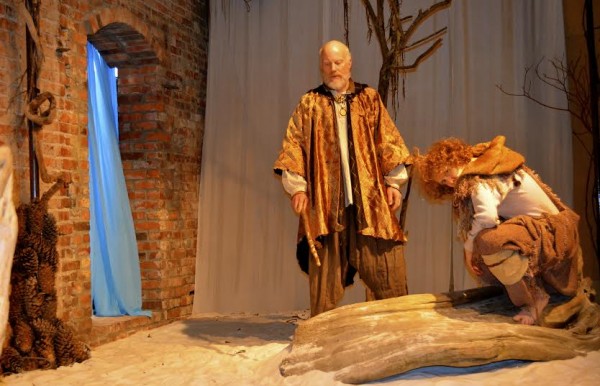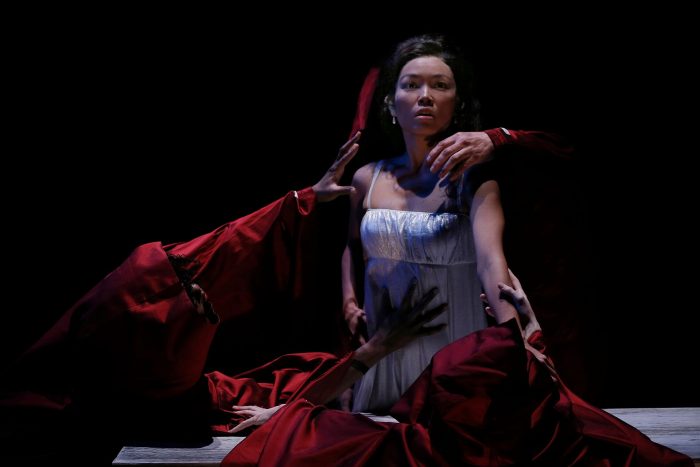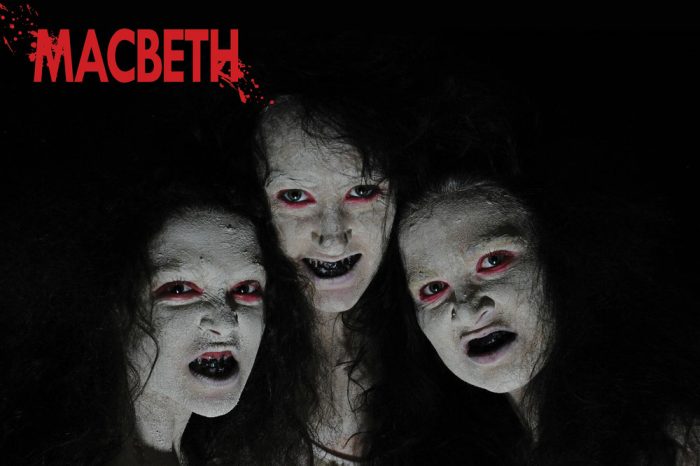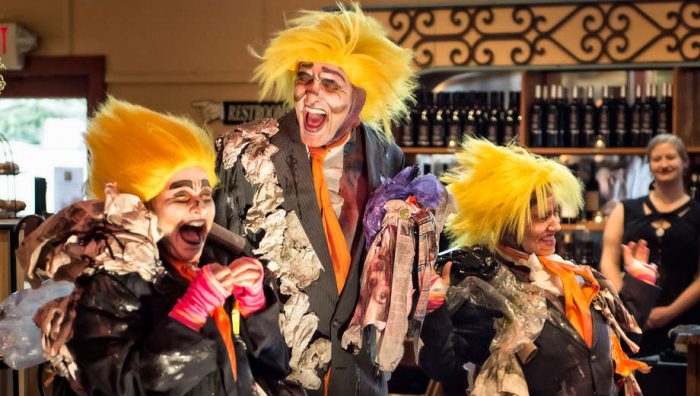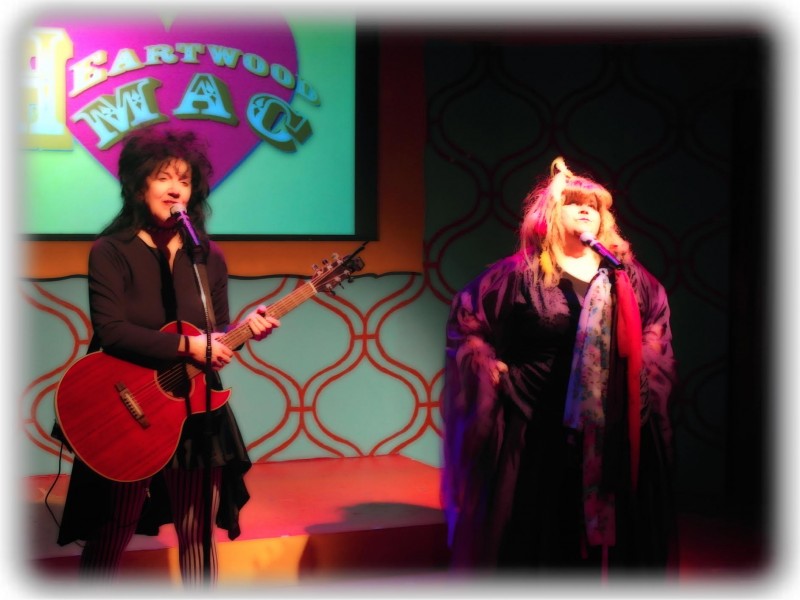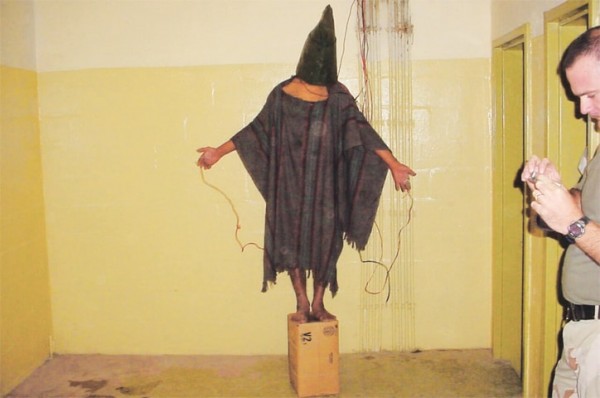Review: The Tempest by William Shakespeare. Produced by Ewald/Kazanjian Productions. Directed by John Kazanjian. Choreography by Mary Ewald. With Susan Corzatte, Cynthia Whalen, Peter Crook, Mary Ewald, Kevin McKeon, Brandon J. Simmons, Seanjohn Walsh, Meme Garcia, Julie Jamieson, Harry Todd Jamieson, Skylar Tatro, Elena Ewald Kazanjian, Nancy Brasseale, Piper Carafa-Olson. Now through April 30, 2016 at New City Theatre.
Last weekend’s theatrical treats included a visit to Shakespeare’s (alleged) final work and an oddly absurd encounter with Urban Tigers and Dysfunctional Marriages.
We’ll start off with The Tempest, which is suspected to be the final play that Shakespeare wrote by himself. It’s the slightly melancholic but altogether magical Shakespearean farewell set on a mysterious island in the Mediterranean which has become the home of the presumed dead Prospero and his young daughter Miranda who were forced out of Milan at the hands of Prospero’s shady brother Antonio who was aided by the machinations of King Alonso of Naples. Prospero has spent his exile on the island learning to harness the power of magic and illusion with the aid of the fairy Ariel and conjures up the Tempest of the play’s title to shipwreck Antonio and Alonso who just happened to be sailing by the island.
Prospero wants revenge and connives to punish Antonio and Alonso. Meanwhile, Miranda falls in love with Alonso’s son, Ferdinand which complicates matters. Ariel desperately wants to be freed of her obligation to Prospero (who rescued Ariel from magical bondage). And, Caliban, the deformed slave who not surprisingly resents his enslavement, conspires with two other castaways, the drunken Trinculo and Stephano, to usurp Prospero and take control of the island.
The Tempest has, over the centuries, gone from being considered a rather minor work, to now being placed high in the Shakespearean canon. Possibly due to the magical elements and its rather simple and easy to follow plot and structure (it’s also one of the shorter Shakespeare plays), but mainly for its rather elegiac tone and sense of bittersweet farewell. It’s a wistful and charming work with a fascinating cast of characters and a plot that deftly combines drama, magic, low comedy and even a considerable amount of music into an evening’s entertainment.
New City Theater, or as they are billing themselves for this production as an “Ewald Kazanjian production” is the partnership of actor Mary Ewald and director John Kazanjian who have been partnering in life and theater for many years with notable success including their recent productions of Beckett’s Happy Days and last year’s strangely delightful production of a new play called MUD. Once again, Mr. Kazanjian directs but Ms Ewald is sharing roles with actor Peter Crook with the two trading off the roles of Prospero and Caliban each night. In the close confines of the New City theater space, a tiny store front on the frontiers where Capitol Hill and the Central District overlap, it’s an intimate space that can feel claustrophobic at times but the chamber sized scope of this production works well within the confines of the staging area. It was a nice way to see the characters up close and in person.
Mr. Crook played Prospero on opening night last week, with Ms Ewald tackling Caliban and both were in fine form. Ms Ewald’s robustly vulgar and loathsomely corrupt Caliban was a delightful crowd pleaser as the character plotted the overthrow of Prospero with comedic aid from a pair of scoundrels, very well played by Julie Jamieson and Harry Todd Jamieson. The trio were a highlight of the night; you looked forward to the three returning every time they exited the stage.
While Mr. Crook had the proper world weary gravitas that’s needed to flesh out a character like Prospero, he did seem that he was still finding his way around the role on opening night; it wasn’t a fully assured performance yet. But Mr. Crook’s talent as an actor will undoubtedly help him flesh out the performance in time and ground it with more confidence.
The rest of the cast is populated with an impressive array of Seattle actors many of them playing against gender, including Susan Corzatte who lends a wonderful sense of faded dignity as the King of Naples and Kevin McKeon as the slyly conniving brother, Antonio. The superb and more experienced members of the cast do highlight a disparity between their levels of talent and those of some of the younger, far less experienced actors in the production but that’s also a part of theater…older actors mentoring younger ones. For some of the young cast members, they’ve just been treated to a month plus long masterclass in acting from some of Seattle’s most esteemed actors. Lucky them!
This “Tempest” also features some lovely set and costume design work from longtime Ewald/Kazanjian collaborator Nina Moser, aided by Eve Cohen. Once again, an Ewald/Kazanjian “joint” is worth your time to go and see. The Tempest is a lovely chamber box production of one of Shakespeare’s most delightful plays.
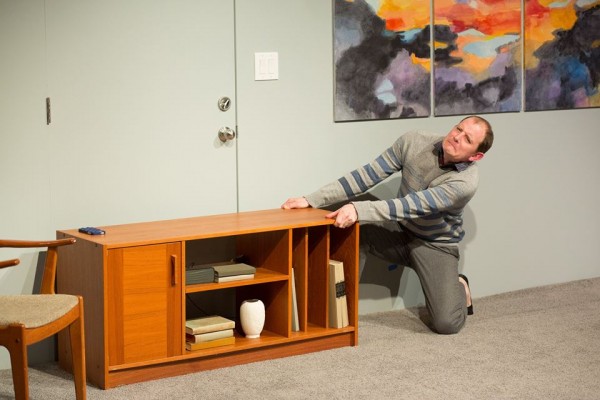
Bradford Farwell as Humphry has to learn the answer to the question: “What is worse than tigers?” in the Red Stage/Act Lab production of…’Worse Than Tigers’ by Mark Chrisler.
Review: Worse Than Tigers by Mark Chrisler. Produced by Red Stage with ACT Lab. Directed by Emily Penick. With Kirsten Potter, Bradford Farwell, John William Watkins. At ACT’s Bullitt Cabaret through April 17, 2016
Meanwhile, over at ACT and as part of their superb ACT Lab series of mentored co-productions with smaller, up and coming theater companies, there’s a new play called “Worse Than Tigers” by Mark Chrisler, the inaugural production from an all female driven theater company called Red Stage.
Worse Than Tigers is an absurdist take on a marriage that’s in ruins. The uptight, neutral toned world of Olivia and Humphrey is defined by their relationships with their phones rather than with each other…the play opens with the pair engrossed with social media and seemingly oblivious to the fractures in their lives and marriage. Like Godot, they’re waiting for a guest to show up to change their lives, but the news that an escaped tiger from the local zoo is on the loose changes things considerably. As does the arrival of an aggressive cop who may or may not have a prior relationship with Olivia. Things begin to unravel as secrets are revealed and all the characters ponder the eternal question: “What is ‘worse than tigers’?”
There’s a lot going for this play including some smart dialogue and cleverly executed plot surprises. Mr. Chrisler has a way with absurdism, which isn’t an easy medium to pull off. Emily Penick has done a great job of staging this play within the confines of Jennifer Zeyl’s clever “arena” styled set. Worse Than Tigers is all about the battle between Olivia and Humphrey and all the elements of this production work in harmony to create a terrific unified whole.
And, all three performances are superb. Experienced Seattle theater goers figured out long ago that Brad Farwell and Kristen Potter are great actors and both actors are in fine form here (even with Ms Potter obviously fighting valiantly against a cold/allergies and a ‘husky’ voice). Both actors create a very believable dysfunctional couple dealing with the after effects of a great tragedy in their lives. And, they’re aided by John William Watkins as the third character, the mysterious policeman who invades their home. Mr. Watkins is deliciously sincere as the most insincere of law enforcement officers; it’s a rich comedic performance.
My only quibble with this play and production: I’m not in love with the switch in tone in the final quarter of the play as Mr. Chrisler de-emphasizes the absurdism of everything that happens in the first 3/4 of the work to a more realistic and grounded explanation for the cause of this couple’s problems. It’s like starting out the evening watching an Albee play and ending the night in the land of William Inge. For me, it doesn’t really work; it’s too abrupt of a segue and the ending tends to devalue the tone of the first part of the material. It’s not a deal breaker, but it’s enough to make me question the intent of that choice by the playwright.
That said, I can still recommend Worse Than Tigers for its overall entertainment value and the skill displayed by all the artists involved in the production. It’s a great start for Red Stage and another plus for ACT Lab.


